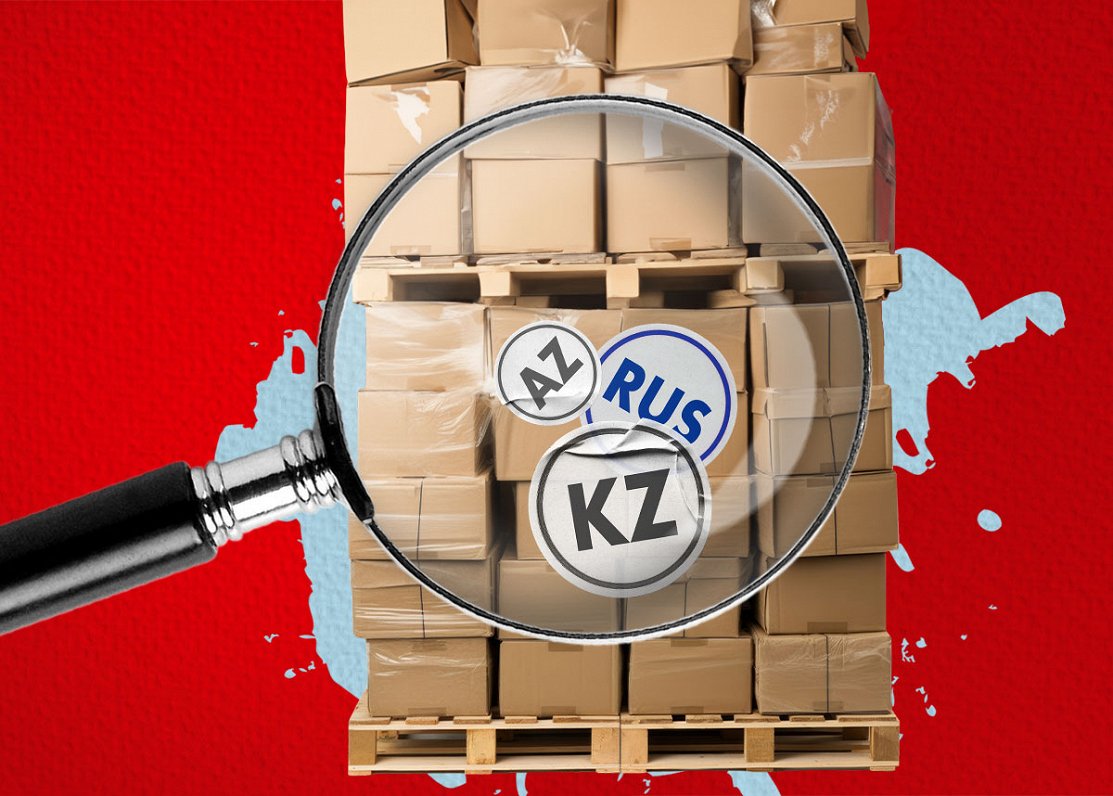According to the show, customs officers are detecting more and more attempts to circumvent European Union sanctions with exporters often implementing various evasion schemes via third countries.
Atis Pīlāts, head of the Risk Management Department of the Customs Administration of the State Revenue Service said: "Customs has, in principle, largely subordinated its work to control sanctions and prevent the circumvention of sanctions, all these attempts and schemes."
The efforts of the customs officials have already resulted in the initiation of several hundred criminal cases and the confiscation of the sanctioned goods.
Jānis Nebars, Head of the Resources Department of the Security State Agency: "This is a large number of loads that are stored in our warehouses."
However, the examination of criminal cases does not necessarily go quickly or smoothly and the confiscated goods are stored in the warehouse for months. This creates considerable costs for the public purse.
Two years after Russia's full-scale invasion of Ukraine, attempts by some in Latvia to circumvent sanctions in export transactions with third countries are not decreasing, but increasing. Although in the last two years, since Russia's full-scale invasion of Ukraine, 310 criminal proceedings for violation of sanctions have been initiated in Latvia, only a small number – 22 cases – have reached the courts, with only seven judgments having entered into force.
"You can see that the number of initiated criminal proceedings is large, but only seven cases have been considered in the courts. But these criminal proceedings, at least, have entered into force verdicts indicate that they have been initiated and the accused are natural persons from the Republic of Latvia," said certified international sanctions specialist Jānis Ciguzis, an international sanctions specialist and assistant attorney at the "BDO Law" office.
Another unifying factor is that the defendants in all cases pleaded guilty and entered into an agreement with the prosecutor.
"I tried to understand how these violations manifest themselves. Most often, they are not deficiencies in the internal control system, where you miss something. Unknowingly or through some third countries, your goods have arrived somewhere. So far, the first instance court of Latvia has not heard such a case. where such a verdict has entered into force. In essence, the cases are about intentional violations," Ciguzis said.
Gas cylinders, a football player and a luxury car
If you analyze the cases of sanctions proceedings, then each of them is different. And the goods making their way to Russia and Belarus are different: starting from liquefied gas cylinders, wooden track sleepers, and ending with the case in which a Latvian football club sold a Brazilian player to a Belarusian club.
"The problem was that this Belarusian club, which bought this player, belongs to a Belarusian state company OJSC Belaz, which is one of the largest truck manufacturers in the world and provides considerable income to the Lukashenko regime. Therefore, it is included in the list of sanctions," said Ciguzis.
There are also two propaganda cases where some Latvian persons have made content available to a Russian federal news agency.
However, the loudest and most ambitious sanctions proceedings are related to the luxury car trade.
Publicly available information shows that a "Bentley" brand car was sold from Latvia and a Kyrgyz citizen is indicated as the recipient in the bill of sale. However, the car was imported for use in Russia through the Narva border checkpoint in Estonia and illegally handed over to a Russian citizen, who registered the car as his own. The Latvian court imposed a fine of more than 170,000 euros in the case.
Jānis Ciguzis has observed that the penalties are gradually increasing in the cases tried so far: "Penalties are getting tougher recently. It is noticeable. If in that case of selling a football player there are 10 minimum monthly wages, then in the last case there is a hundred [monthly wages]. So the penalty is ten times higher. Also the security measures applied are more severe."
Customers and supply chains should be studied
The specialist lawyer also revealed that several companies have approached the law firm so far, not to ask for legal assistance in sanctions proceedings, but to proactively find out what risks exist in international transactions.
"Theoretically and also in practice, it often happens that when [an item is] exported to Europe, it can end up in Russia. And then there is the question of whether I am responsible for it. How can I know that my partner further down the supply chain will not commit a violation and I won't it be held responsible?" said Ciguzis.
To avoid such situations, companies need an internal sanctions control system and research into customers, business partners and supply chains.
Chasing customers is also relevant for commercial banks, which in the last two years have intensified monitoring of their customers' transactions with third countries, through which exporters often bypass sanctions.
The head of the Money Laundering Prevention Department of the Bank of Latvia, Kristaps Markovskis, said that after analyzing the payments of commercial banks, it can be concluded that after the start of Russia's full-scale war in Ukraine, payments to Russia decreased significantly. Several banks decided not to make any payments with the aggressor country at all.
"At the same time, we saw an increase in payments to those countries where we also saw an increase in exports and imports – Kazakhstan, Azerbaijan, also the United Arab Emirates. We see an increase in the flow of transactions. So there is a kind of correlation there between the import and export data and also increases in transaction flows. But I must say right away that this increase does not replace the decrease with regard to Russia. It is much, much less. As soon as we noticed this, we met with the financial sector and pointed out these sanctions evasion risks," said Markovskis.
The representative of the Bank of Latvia is convinced that commercial banks deal successfully with the evaluation of customer transactions.
"In general, I can say that the financial sector is coping well with the application of sanctions. Our banking system has improved significantly in recent years, and this is also one of the indicators why banks are better able to identify and report these cases of circumvention of sanctions," Markovskis said.
Commercial banks' reports on suspicious transactions are received and evaluated by the Financial Intelligence Service (FID). The deputy head of FID, Paulis Iljenkovs, emphasized that the ability of commercial banks to detect suspicious transactions is positive and the statistics also show this.
"In 2022, we received 281 reports of suspicious transactions that could have circumvented sanctions. And the current information for 2023 is with an increasing trend. So we saw 510 reports of suspicious transactions for circumventing sanctions," said Iljenkovs. So the number of reports of suspicious transactions has increased by about 80%.
It is true that not every suspicious transaction means that sanctions have been violated, but the FID evaluates each of these cases.
"After analyzing these cases, we either inform the SRS Customs Administration, so that the colleagues of this institution can pay more attention to the merchants we have reported on. Or, if we already have reasonable suspicions and have collected sufficient information, we transfer information for the possible initiation of criminal proceedings at the Tax and Customs Administration of the SRS or the State Security Service. We cooperate with the State Security Service directly in cases of violation of financial sanctions, where there are nuances in their violation, unlike bans on the export and import of goods. There, the sanctions are of a different type, and the methods of circumvention also differ," said Iljenkovs.
The State Security Service (VDD) informed Latvian Radio that since the start of the war in Ukraine by Russia, the institution has initiated a total of 14 criminal proceedings on the basis of suspicion of violation of sanctions imposed by the European Union (EU). Of these, only three criminal proceedings are related to the export of goods.
In these criminal proceedings, the Service conducts investigations on the basis of suspicion of unauthorized export of goods to Russia or Belarus, using Kyrgyzstan, Kazakhstan or China as an intermediary country to circumvent sanctions. Investigations are currently ongoing, therefore the VDD refrained from further comments and declined to mention specific companies whose activities it has investigated.


























